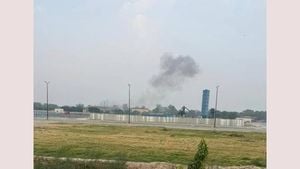Representative Rich McCormick, R-Ga., sparked controversy this week during interviews about federal funding for school lunches, insisting the programs encourage children to depend on government rather than work for their meals. His comments come amid President Donald Trump's recent move to freeze federal grants, which threatens the support for millions of vulnerable children across the country.
McCormick spoke with CNN anchor Pamela Brown on Tuesday, where he asserted, "You’re telling me kids who stay at home instead of going to work at Burger King or McDonald’s during the summer should stay at home and get their free lunch instead of going to work?" His comments insinuated not only skepticism about free school lunches but also painted children relying on these programs as lacking motivation to find work.
This freeze could affect around 30 million children who depend on free or reduced school lunches, according to sources familiar with the programs. Critics, including Micah Erfan from the Texas Democratic Party, expressed outrage over McCormick's implication of poor children as "moochers" needing to earn their meals.
While discussing his own experiences, McCormick recounted working from age 12, saying, "I was picking berries before child labor laws and was a paperboy. I worked my way through high school." Such anecdotes, he argued, support his belief in the necessity of instilling work ethics among today's youth.
Despite the backlash, McCormick remained steadfast, declaring, "We count on people being able to dig themselves out. We must evaluate how we spend taxpayer dollars" during the segment from Doral, Florida, where House Republicans were holding their annual issues conference.
CNN's Brown countered McCormick's assertions, pointing out, "I think you’re painting these kids with a broad brush. That’s not necessarily fair assessment of all the kids involved." Her rebuttal highlighted the reality of many children needing assistance to learn without the added stress of hunger.
McCormick's position aligns with broader Republican sentiments advocating for significant cuts to welfare programs, which some argue discourage hard work. He stated, "I think we need to have a top-down review. Who’s going to produce their own income?" and suggested the freeze on federal funds was necessary to reconfigure government priorities.
Critics have noted the benefits of providing school lunches, which include improved academic performance and healthier dietary habits among students. Reports indicate free and reduced-fee lunch programs are especially significant, with data from Georgia showing 64% of students were eligible for these meals in the fiscal year 2024.
McCormick's views have entered the public discussion about child labor and the responsibilities of the government versus the responsibility of families. He suggested those in poverty are hindered by the systems intended to help them. "The government penalizes them for actually working, keeping them on welfare instead," he remarked, indicating the need for people experiencing financial challenges to have more opportunities to improve their circumstances.
This sentiment raises questions about the accessibility of jobs for children, especially as critics reference the impracticality of expecting young children to take on work duties. The discontent surrounding McCormick’s comments reveals deep divisions on how best to approach poverty alleviation and the safety net provided by social programs.
Meanwhile, the freeze on federal grant spending, outlined by acting Budget Director Matthew J. Vaeth, aims to pause nearly all federal funding arrangements as the administration seeks to align spending with its priorities. Programs affected by this pause include not only school meals but also childhood cancer research and other educational supports.
"The use of Federal resources to advance Marxist equity, transgenderism, and green new deal social engineering policies is wasteful," Vaeth said, underscoring the administration’s focus on reevaluing federal budgeting.
With the Trump administration’s fiscal policies garnering pointing fingers from both sides of the aisle, the contentious debate will likely continue. McCormick's remarks have already invited significant backlash on social media, reflecting public outrage from various stakeholders.
Families and experts urge officials to reconsider the lasting effect of such funding freezes on the educational and well-being of children nationwide. Notably, many children who are benefitting from school lunch programs may not even be of working age, which complicates McCormick's assertions.
Growing voices of disapproval suggest this matter is not only about lunch and employment; it reflects wider issues around economic equality and government responsibility to its citizens. The debate may influence broader discussions about social programs and their roles amid changing governmental priorities.
With schools set to return to session, many will be watching closely to see how these funding freezes and criticisms develop and what they might mean for child welfare — not just for the lunchroom but for the future of millions of American students.



